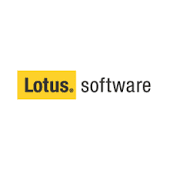Lotus Development Corporation, or Lotus, was a well-known American software business noted for its innovative work in the development of office productivity software. Mitchell Kapor and Jonathan Sachs launched the firm in 1982. Lotus was best known for its spreadsheet software, Lotus 1-2-3, and played an important role in the early days of personal computing.
Lotus came at a time when computers were starting to become more accessible to individuals and business corporations. It developed a software a 3-way software know as Lotus 1-2-3. This software became the game changer then. It served as a spreadsheet, graphing tool as well as a database manager.

The Lotus 1-2-3 bypassed the IBM PC’s operating system, making it far faster than its competitors. Furthermore, its mix of spreadsheet features with visuals and data retrieval made the application popular.
The company became so huge that made $12.8 in revenue and it went public afterwards. The company became so successful that it made $53m in sales in its first year which was very huge because it projected to make just $1m in its first year of inception.
Major Highlights About Lotus Development Corporation
Lotus 1-2-3: Launched in 1983, Lotus 1-2-3 revolutionized the landscape of spreadsheet applications for IBM-compatible personal computers. This software amalgamated spreadsheet functionality, charting capabilities, and database functionality into a single software package. It swiftly became a preferred choice among businesses and professionals, significantly contributing to the widespread adoption of personal computers in corporate environments.
Graphical User Interface (GUI): Lotus was at the forefront of embracing graphical user interfaces (GUIs) in its software, enhancing usability and distinguishing itself from competitors.
Lotus Notes: In 1989, Lotus introduced Lotus Notes, a collaborative software platform that seamlessly integrated email, document sharing, and database capabilities. Lotus Notes emerged as a pivotal tool for communication and collaboration within organizations, gaining substantial popularity in the corporate sector.
Acquisition by IBM: In 1995, IBM acquired Lotus Development Corporation for an approximate sum of $3.5 billion. Following the acquisition, Lotus continued its operations as a subsidiary of IBM, and its product portfolio was integrated into IBM’s software offerings.
SmartSuite: In addition to Lotus 1-2-3 and Lotus Notes, the company also developed Lotus SmartSuite, a comprehensive office suite encompassing word processing, spreadsheet, presentation, and other productivity applications. It competed directly with Microsoft Office.
Decline: What happened to Lotus Software ? Despite its initial success and innovative products, Lotus faced challenges during the late 1990s and early 2000s. Microsoft’s Office suite, particularly Microsoft Excel and Microsoft Word, gained dominance in the market, resulting in Lotus losing market share.
Legacy: Although Lotus 1-2-3 and Lotus Notes are no longer as prevalent as they once were, their profound impact on the software industry and the transformation of business operations remains noteworthy. The pioneering concepts and features introduced by Lotus continue to influence modern productivity software.
IBM Notes and IBM Domino: Post-acquisition, Lotus Notes and Lotus Domino (the server component) underwent rebranding as IBM Notes and IBM Domino, respectively. IBM continued to develop and support these products, catering to enterprise customers.
Transition to Cloud Services: In recent years, IBM shifted its strategic focus toward cloud computing and services, and the Lotus brand has receded in prominence within the contemporary software landscape.
In conclusion, Lotus Development Corporation was a pioneering American software company that made an evident impression on the field of office productivity software. Lotus 1-2-3, its flagship software, was essential in the early use of personal computers in corporate settings, while Lotus Notes transformed communication and cooperation within enterprises. While the competitive landscape has changed over time, Lotus’ contributions to the software industry and influence on modern productivity tools remain an important part of its legacy.


